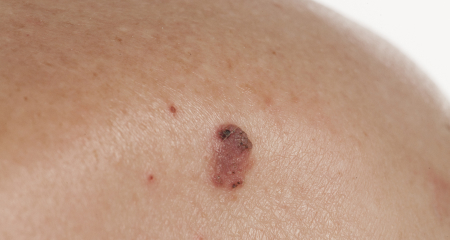
Melanoma is the most serious form of skin cancer. Although it is the rarest form of skin cancer, it is the most dangerous. Melanoma can quickly spread to the lymph nodes and internal organs, which can result in death. Fortunately, Melanoma is highly treatable when detected early. It is crucial that you
contact your specialist at Northstar Dermatology if you find a new or changing spot.
Melanoma develops from abnormal mutations of the skin’s melanocytes (pigment producing cells). Anyone of any skin type can develop Melanoma, but there are certain factors that can increase your chance of developing this serious form of skin cancer.
Chances of developing Melanoma may increase from:
• History of prolonged sun exposure or indoor tanning
• History of blistering sunburns
• Having fair skin, light-colored eyes, or naturally red or blonde hair
• Having a large number of moles
• A family history of Melanoma
Melanoma is the deadliest form of skin cancer. However, when detected early, melanoma is highly treatable. Regular skin exams by a board-certified dermatologist can help identify signs of Melanoma. You can also perform self-skin-checks to look for the warning signs of melanoma.
Check your moles for the following:
• Asymmetry: one half doesn’t mirror the other
• Border: blurred, uneven, or scalloped mole edges • Color: multiple hues within a single mole
• Diameter: noticeable growth in mole size
• Evolution: the spot looks different from the rest or is changing in size, shape, or color If a mole exhibits any of these traits, be sure to request a Skin Cancer Screening with a specialist at Northstar Dermatology
The physicians at Northstar Dermatology specialize in surgical treatment of Melanoma. The most common method of treatment is surgical excision, where the dermatologist will surgically remove the cancerous tissue as well as a margin of tissue around the lesion to ensure complete clearance. The area is closed with sutures and some downtime will be required, including restrictions of lifting and physical activity for a couple weeks.
Other forms of treatment may include a referral to a Mohs surgeon. If the Melanoma has progressed to a certain stage, a referral to an Oncologist may be recommended.
If you are diagnosed with a Melanoma, it is imperative that you follow up with your dermatologist as soon as possible for treatment, as Melanoma can quickly progress and become deadly. Consult with your board-certified dermatologist on the best course of action for treatment.
